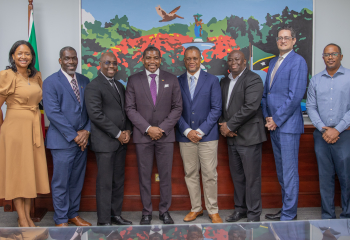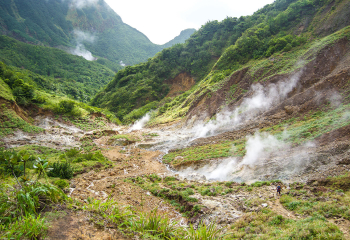Canada is focused on building disaster risk management and improving resilience to climate change impacts in the Caribbean.
Matthew Straub, First Secretary (Development) at the High Commission of Canada in Barbados, highlighted this commitment at a recent capacity-building workshop for community-based groups and community development practitioners in St. Vincent and the Grenadines. The workshop was organised by the Community Disaster Risk Reduction Fund (CDRRF), which is administered through the Caribbean Development Bank (CDB), with donor funding from Canada and the European Union.
“Quickly following the 2017 hurricane season, Canada strengthened its commitment to the Caribbean, pledging CDN $100 million to help countries build back better, and strengthen their resilience to climate change. We are executing this pledge through a number of initiatives across the Region,” said Mr. Straub, who is also Chairman of the CDRRF Trust Fund Steering Committee.
Mr. Straub highlighted the significance of the CDRRF workshop in building community resilience to the face of more frequent and intense climate shocks.
“This is a collaboration that has found success in going beyond conventional approaches to community capacity development and awareness building,” he said. “I can tell by my interactions with project partners and stakeholders that there's a holistic approach in this endeavor. One that includes community engagement, public education and awareness, informed decision making, and inclusive community stakeholder exchange, which all serve their own purpose in adapting and responding to the multi-hazard risks of the natural environment.”
“This is what we set out to accomplish with the CDRRF. I hope that we can share this experience and lessons learned to bring positive change around resilience and disaster management in communities regionally, not just here,” he added.
CDRRF organised the workshop in partnership with the Ministry of National Mobilisation, Social Development, Local Government, Gender Affairs, Family Affairs, Persons with Disabilities, and Non-Governmental Organisations. It was one of several activities under the Volcano Readiness project being implemented in SVG by the Seismic Research Centre to bolster the country’s response to volcanic and other natural disaster risks through creating, formalising, and sustaining community-based organisations. The project is one of eight which CDRRF is implementing across the Caribbean, with others in Jamaica (5), Belize (1), and British Virgin Islands (1).
“At the end of the day, it is the neighbours and the communities in the immediate vicinity of natural hazards that are the most vulnerable and the first to respond to disasters,” said Straub.


